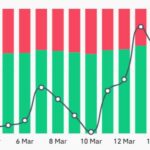In a significant development within the cryptocurrency and trading landscape, Massachusetts’ top securities regulator is reportedly investigating Robinhood over its newly launched prediction markets hub. According to a recent report from Reuters, Secretary of State Bill Galvin has issued a subpoena to Robinhood, aiming to gather information on the number of Massachusetts users interested in trading contracts related to college sports events, such as March Madness. Galvin, known for his stringent regulatory stance, criticized Robinhood as a company that often employs gimmicks to attract investors away from more traditional investment strategies.
“This is just another gimmick from a company that’s very good at gimmicks to lure investors away from sound investing,” Galvin stated in his remarks.
The investigation comes shortly after Robinhood’s prediction market feature, which allows users to bet on event outcomes, was launched on March 17. This new offering, powered by the Commodity Futures Trading Commission (CFTC)-regulated Kalshi, includes contracts tied to both March Madness match-ups and the target federal funds rate. Robinhood maintains that these event contracts are regulated and provided through CFTC-registered entities, emphasizing their commitment to a safe trading environment for users.
“Prediction markets have become increasingly relevant for retail and institutional investors alike, and we’re proud to be one of the first platforms to offer these products to retail customers in a safe and regulated manner,” a Robinhood spokesperson remarked.

Massachusetts Launches Probe into Robinhood’s Prediction Markets
The recent decision by Robinhood to introduce an in-app prediction markets hub has raised eyebrows and drawn scrutiny from Massachusetts regulators. Here are the key points regarding this issue:
- Investigation Initiated: Massachusetts Secretary of State Bill Galvin has launched a probe into Robinhood’s prediction markets, sending a subpoena for user data in the state.
- Focus on Sports Betting: The investigation looks particularly at the trading of college sports event contracts, highlighting potential risks associated with such activities.
- Response Deadline: Robinhood has until April 3 to respond to the subpoena, which could impact its operations in Massachusetts.
- View of Regulators: Galvin criticized Robinhood’s move as a “gimmick” aimed at attracting users without promoting sound investment practices.
- Collaboration with CFTC: The prediction market is linked to the Commodity Futures Trading Commission (CFTC), which regulates these financial products.
- Previous Launch Attempt: Robinhood previously sought to launch its prediction markets hub before the Super Bowl but delayed it at the request of the CFTC.
“Prediction markets have become increasingly relevant for retail and institutional investors alike.” – Robinhood spokesperson
This investigation and the surrounding circumstances may impact readers in several ways:
- For traders and investors, understanding regulatory scrutiny helps make informed decisions about engaging with online trading platforms.
- The development of prediction markets could influence investment strategies, particularly in emerging sectors like sports betting.
- Awareness of regulatory actions can foster a broader conversation about ethical investing and the responsibility of trading platforms to their users.
Massachusetts Regulator Takes Aim at Robinhood’s New Prediction Market
The recent move by Massachusetts securities regulator Bill Galvin to investigate Robinhood’s prediction markets hub has stirred the pot in the fintech industry. While the platform aims to position itself at the forefront of retail investment innovation, this probe places a spotlight on the regulatory challenges that new financial products can face. In comparison, other trading platforms, such as Webull and E*TRADE, have launched their own innovative trading solutions with markedly fewer regulatory hurdles, suggesting that they could have a competitive edge over Robinhood in navigating regulatory scrutiny.
Competitive Advantages: Robinhood’s prediction market is designed to tap into the burgeoning interest in event-based trading, using CFTC-regulated platforms to give users confidence in the legitimacy of their betting practices. This feature could significantly enhance user engagement, particularly among younger demographics drawn to high-stakes events like March Madness. It also positions Robinhood as an early mover in this niche market, potentially attracting investors eager to experiment with various trading models.
Competitive Disadvantages: However, the regulatory investigation fuels skepticism about Robinhood’s practices, potentially undermining consumer trust. Galvin’s sharp criticism highlights the vulnerabilities of Robinhood’s strategy, which leans heavily on gimmicks to attract new users. This could deter more cautious investors who might prioritize stability and regulatory compliance over novelty. In contrast, competitors with a solid reputation for prudent and traditional investment strategies may attract users concerned about Robinhood’s tangled web of compliance and ethical issues.
This investigation might ultimately benefit other financial platforms looking to solidify their market position by highlighting Robinhood’s missteps. They can leverage this moment to emphasize their own commitment to regulatory compliance and responsible investing. On the flip side, the scrutiny could backfire for Robinhood, making it harder to shed its reputation for facilitating risky trading practices and attracting more regulated investors.














